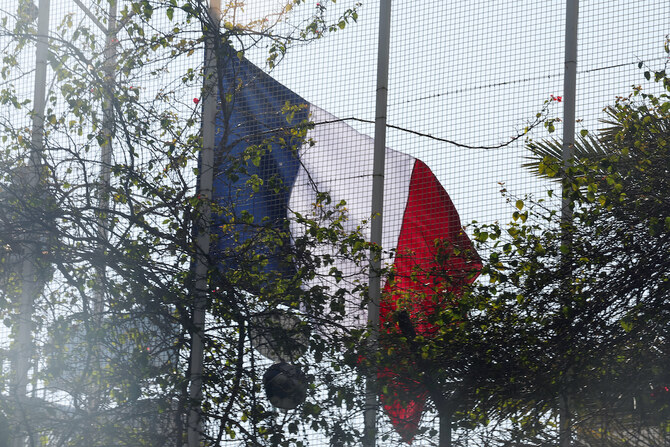DAMASCUS: France raised its flag at its Damascus embassy on Tuesday for the first time in 12 years and European Union officials prepared to engage with the new Syrian leadership, a sign of the growing contacts after Bashar Assad was ousted as president.
Western states are gradually opening channels to the new authorities in Damascus led by Hayat Tahrir Al-Sham and its leader Ahmed Al-Sharaa, though they continue to designate the group as terrorists.
As well as France and Britain, which sent a team to meet Sharaa on Monday, Germany is also planning meetings with the new administration and the European Union said on Tuesday it will also establish contacts.
Nine days after Assad was ousted, the new prime minister installed by Sharaa’s Islamist HTS group said the government was grappling with very low currency reserves and called for sanctions imposed on the ousted government to be lifted.
Sharaa’s group was part of Al-Qaeda until he broke ties in 2016. It had been confined to a northwest corner of Syria for years until this month when the army melted away as it swept into Damascus.
France said its raising of the flag did not automatically mean it would reopen its embassy.
During his meeting with British officials, Sharaa, formerly known by his nom de guerre Abu Mohammed Al-Golani, called for countries to restore ties and lift sanctions on Syria to help refugees return home, Syria’s state news agency SANA reported.
SANA released photos of Sharaa sitting in a suit with an open shirt during the meeting with the British. Sharaa “spoke about the need to build a state of law and institutions, and establishing security,” SANA reported. “He also spoke about Britain’s important role internationally.”
Assad’s fall, a blow to Syria’s longstanding Russian and Iranian allies, could potentially open the way for Western states to reopen contacts with Damascus. But for now at least, that requires manoeuvring around both the terrorism designation imposed on HTS during its days as an Al-Qaeda affiliate and financial sanctions imposed on Damascus under Assad.
German diplomats are also planning talks with representatives of HTS in Damascus on Tuesday, the German foreign ministry said. A German foreign ministry spokesperson said the talks would focus on a transitional process for Syria and the protection of minorities.
“The possibilities of a diplomatic presence in Damascus are also being explored there,” the spokesperson added in a statement, reiterating that Berlin was monitoring HTS closely in light of its roots in Al-Qaeda ideology.
“As far as one can tell, they have acted prudently so far,” the spokesperson said.
Turkish President Tayyip Erdogan, whose country was the biggest backer of rebels during the civil war, said an inclusive administration was now needed in Damascus and called on the European Union to support the return of refugees.
In an interview with Al Jazeera Mubasher, the newly installed Prime Minister Mohammed Al-Bashir said the defense ministry would be restructured using former rebel factions and officers who defected from Assad’s army.
Syria has many ethnic and sectarian minority groups, some of whom have worried about how they might be treated under the rule of groups such as HTS with roots in Sunni Islamist militancy.
Asked what he would say to those worried about a single religious or political group dominating Syria, Bashir said: “Those who are afraid...of a religion trend or anything else don’t truly understand Islam, the forgiveness of Islam, the justice of Islam.”
“Syria is for all Syrians,” he said. “Everyone is a partner for us building the Syria of the future.”
Bashir, who formerly led an HTS-affiliated government in Idlib province, has said he will remain in office until March.
EU foreign policy chief Kaja Kallas said on Monday the European Union should be ready to ease sanctions on Syria if the country’s new leadership takes “positive steps” to establish an inclusive government and respect women’s and minority rights.
UN humanitarian coordinator Tom Fletcher said he had also met Sharaa, posting on social media: “we have basis for ambitious scaling up of vital humanitarian support” for Syria.
The Syrian conflict, which spiralled out of a 2011 uprising against Assad’s repressive rule, drove millions of Syrians abroad as refugees, including around 1 million who went to Germany.
France returns flag to Damascus embassy as new Syria authorities build contacts with West
https://arab.news/yzfpj
France returns flag to Damascus embassy as new Syria authorities build contacts with West

- UK sends team to meet Hayat Tahrir Al-Sham and its leader Ahmed Al-Sharaa
- German diplomats also plan talks with representatives of HTS in Damascus





























